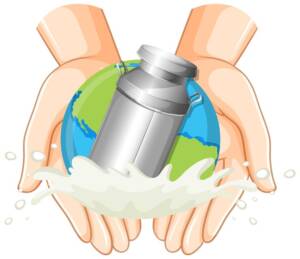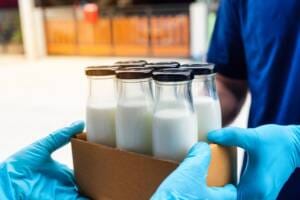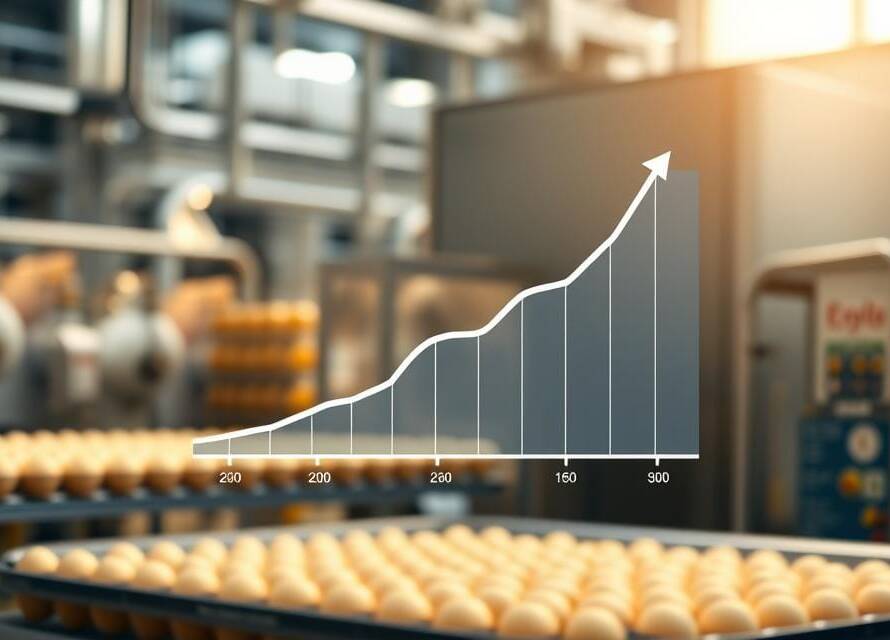
The dairy industry is a vital food industry that plays an important role in the global economy and in feeding millions of people around the world. However, with increasing environmental and social pressures, sustainability in the dairy industry has become a basic requirement to ensure the continuity of this industry without affecting natural resources or causing environmental damage.
In this article, we will discuss the concept of sustainability in the dairy industry, the challenges facing this industry, and the most important solutions that can be adopted to implement sustainable practices.
The concept of sustainability in the dairy industry
Sustainability in the dairy industry means achieving a balance between meeting human nutritional needs and preserving the environment and natural resources for future generations. Sustainability in this industry requires making informed decisions regarding production, consumption, and manufacturing processes, taking into account the environmental and social impact.
Sustainability in the dairy industry involves a set of basic axes, including:
1- Effective management of water resources.
2- Improving animal welfare.
3- Using renewable energy sources.
4- Reducing waste and promoting recycling.
Environmental challenges in the dairy industry
Water consumption
The dairy industry is one of the most water-consuming industries. In addition to the water needed to consume milk, growing the fodder that feeds cows requires a large amount of water. Therefore, conserving water resources becomes a central goal for implementing sustainability in the dairy industry.
Waste Management
The dairy industry produces large amounts of organic waste such as animal waste and excess raw materials, which poses a major challenge in reducing the industry’s environmental impact. Companies must look for innovative solutions to recycle waste or use it as natural fertilizer to reduce the environmental impact.
Sustainable Solutions in the Dairy Industry
1- Improving Water Efficiency
Dairy companies can achieve sustainability in the dairy industry by improving the efficiency of water use in the production process. This includes advanced purification techniques that allow water to be reused in production processes instead of being inefficiently discharged. Sustainable farming methods can also be applied to feed that consume less water.
2- Using Renewable Energy
Relying on renewable energy sources such as solar and wind energy is an effective solution to achieving sustainability in the dairy industry. Dairy companies can invest these resources to operate their factories and production plants, which reduces carbon emissions and reduces reliance on traditional energy sources that contribute to environmental pollution.
3- Sustainable Manufacturing Technologies
Another solution that contributes to achieving sustainability in the dairy industry is developing more energy-efficient manufacturing techniques and reducing product waste. This includes adopting advanced systems to reduce pollution resulting from packaging processes and recycling packaging.
These technologies include:
1- Using sustainable packaging techniques
Packaging is an important area that greatly affects sustainability in the dairy industry. Large amounts of plastic and glass are used in packaging products, which contributes to environmental pollution. To reduce this environmental impact, factories can move towards using environmentally friendly packaging materials such as recyclable packaging or bioplastic materials.
Recycled paper packaging or natural fiber packaging are excellent options to reduce the environmental footprint, and factories can adopt packaging technologies that consume less materials and preserve the product for a longer period, which reduces the need for preservatives and contributes to reducing waste.
2- Implementing environmental safety standards and employee training
Achieving sustainability in the dairy industry is not only limited to applying modern technologies, but also includes improving the environmental safety culture among workers. Factories should develop regular training programs for employees to raise environmental awareness and teach them how to deal with natural resources effectively and reduce waste and loss.
By adopting strict environmental safety standards, factories can ensure that all operations comply with applicable environmental laws and achieve the best results in resource sustainability.
3- Improving productivity using smart systems
One of the most important recent trends to achieve sustainability in the dairy industry is the adoption of smart systems that rely on the Internet of Things (IoT) and artificial intelligence (AI) to monitor and analyze the performance of production processes. Using these systems, dairy factories can track resource consumption such as water and energy in real time, helping to identify areas of waste and improvement. Tools such as smart sensors can help monitor product quality and the environment around the animals, thereby reducing waste and achieving efficiency.
For example, by using AI to analyze environmental data, optimal conditions for milk production can be identified and farm performance improved, reducing the need for harmful chemicals and medicines and increasing the sustainability of production.
4- Improve inventory management and reduce waste
One effective way to achieve sustainability in the dairy industry is to improve inventory management and reduce waste resulting from product storage. In the dairy industry, inventory management is a critical issue due to the rapid spoilage of products. Therefore, factories can use “smart tracking” technology to determine expiration dates more accurately and monitor inventory levels in a more efficient manner. This helps reduce waste of milk and other dairy products and ensures that products are in the best condition for the consumer.
Furthermore, factories can partner with local organizations or charities to distribute products approaching their expiration date, which helps reduce waste and enhances the social role of the factory.
5- Promoting preventive maintenance practices
Preventive maintenance is one of the key factors that contribute to sustainability in the dairy industry. If equipment in the factory is operating inefficiently or is subject to frequent breakdowns, it consumes more energy and resources and increases costs. Therefore, factories can adopt smart maintenance systems that rely on data to anticipate breakdowns before they occur and perform maintenance periodically and effectively.
This not only improves the operating efficiency of the factory, but also helps extend the life of equipment and reduces the need for frequent replacement, which contributes to reducing waste and reducing the use of raw materials.
6- Improving mobility between operations and reducing losses
Sustainability in the dairy industry also includes improving mobility between operations to reduce losses resulting from the internal transportation of raw materials or semi-finished products. The flow of materials in the factory can be improved by using an integrated engineering design that reduces the distances between production stations and reduces the need for transportation between departments. In addition, losses can be reduced by improving separation and filtration techniques in operations such as separating milk from cream, which reduces the volume of waste generated.
Sustainability in the dairy industry is one of the most important issues that companies should consider to ensure the sustainability of the industry and its protection of the environment. By adopting innovative technologies and improving the efficiency of operations, a balance can be achieved between meeting market needs and protecting natural resources. Implementing sustainability practices in the dairy industry is not an option but a necessity to ensure the continuity of this industry in the future.
If you are interested in implementing sustainability practices in the dairy industry in your company, you can contact ProNano Consulting for the necessary support. The company has the experience and resources to provide specialized consulting that helps you transform sustainability challenges into opportunities for growth and innovation. Do not hesitate to contact us to provide you with the best solutions in this field.
Read more about extending the shelf life of ready-made salads



